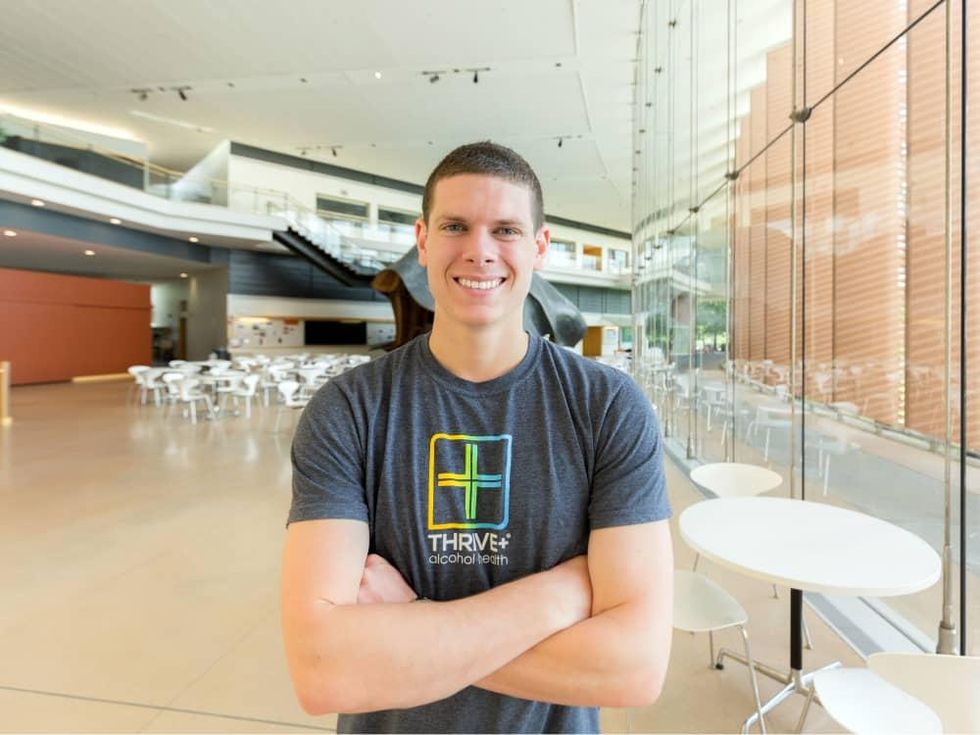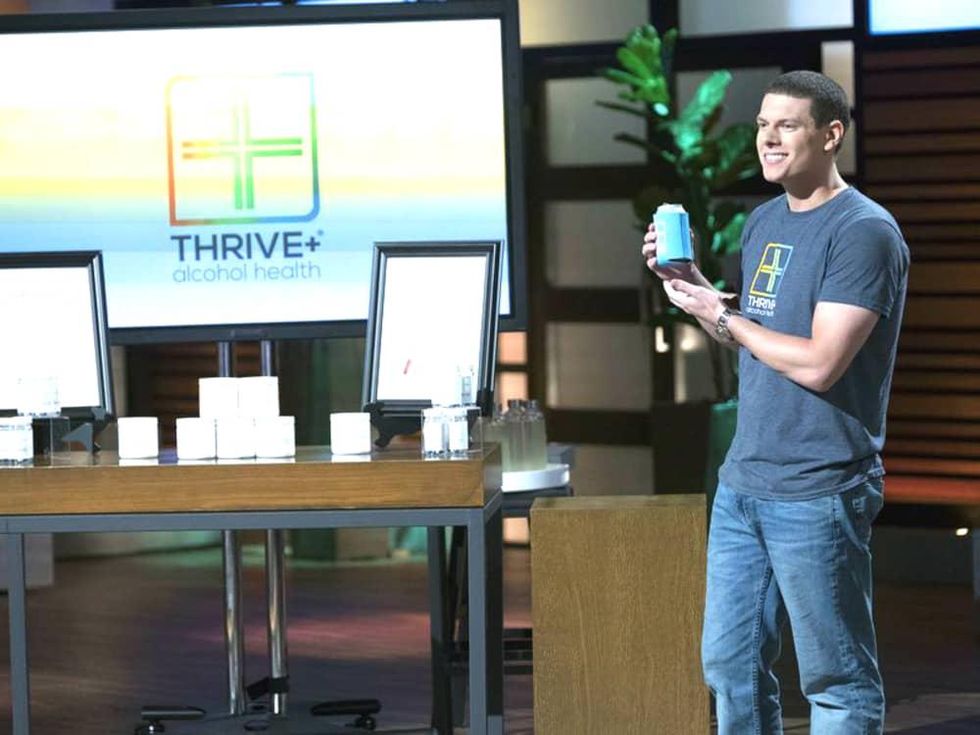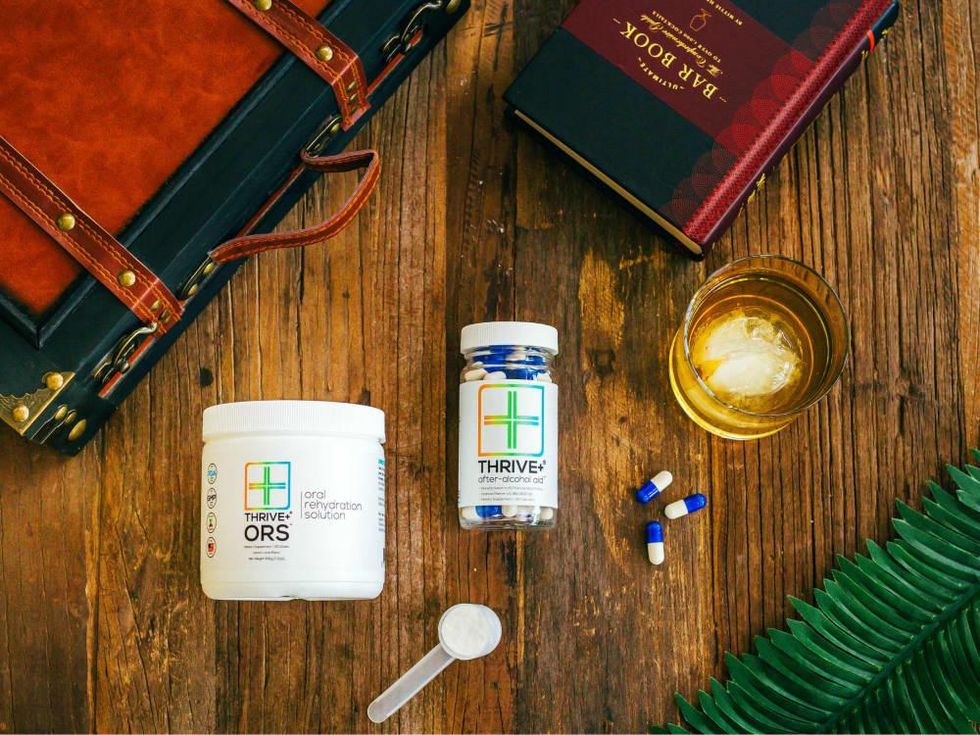hangover helper
Texas creator of 'vitamin for alcohol' dives into ABC's Shark Tank
Texan Brooks Powell was always expected to make a splash.
The 24-year-old was once a top swimming prospect during his time at Kingwood Park High School in the Houston area (in 2012 he was the fastest swimmer in Texas in the 50 freestyle). Heavily recruited by Ivy League schools and the Naval Academy, Powell selected Princeton, where he focused on swimming, and even considered joining the clergy after college.
But a chance reading of the Journal of Neuroscience during his sophomore year yielded an a-ha moment: Powell discovered research on a drug that “instantly sobered up rats, they showed no signs of a hangover, and they had less risk of alcoholism,” he recalls. “I was blown away.” Powell took the findings to his neuroscience professor — who was equally blown away.
With his professor's support, Powell embarked on a quest to see if the drug, dihydromyricetin (DHM for short), would have the same effect in humans. Soon, he quit swimming, and was filing a patent in 2014, recruiting scientists, manufacturing and testing a product, and launching his fledgling company, Thrive+. “We're the first company in the country to have a purified form of DHM,” says Powell. Then it was on to human studies, where “people who were tested reported feeling at least 50 percent better the next day.”
By June 2017, Thrive+ was officially launched. Powell likens his supplement — a “vitamin for alcohol,” to sunscreen: “Sunscreen not only prevents sunburn, but even skin cancer, over time,” he says. “In the same way, Thrive+ isn’t just for hangovers, but for reducing alcohol's negative effects, over time. That's why we think people should take this every time they drink alcohol, even in moderation.”
Powell is the founder and CEO of Thrive+, a company that boasts two Princeton biotech professors on his board, and myriad health professionals on staff. “I had no plans to start a company, but this became my passion, and I never looked back,” he says.
It wasn't long before Powell and Thrive+ caught the attention of producers at ABC's Shark Tank. He appeared on the show Sunday, February 25. Spoiler alert: While the Sharks didn't bite (guest Shark Bethenny Frankel admitted to being overwhelmed and baffled by the science — while host Mark Cuban was lambasted by his colleagues for hijacking Powell's pitch), Powell reports a record number of hits on the Thrive+ site, and more than $100,000 in sales since the airing. The show hits Amazon video February 26, which, according to Powell, promises “more Shark Tank money,” and even more buzz and exposure.
On the eve of his Shark Tank appearance, Powell shared his story with CultureMap. While he understands the buzz that a potential hangover cure-all generates, Powell says he's committed to a greater cause: “We don’t want to be famous for finding a hangover cure. We want to be famous for curing alcoholism.”
CultureMap: The obvious question is, what makes this a "vitamin for alcohol" — versus a hangover cure?
Brooks Powell: This is probably our most-asked question, so I'm glad you asked it.
When people think "hangover," they think it means that someone drank too much, or was irresponsible with alcohol. The truth is, after the age of about 30, even moderate amounts of alcohol consumption will make you feel less than 100 percent. Technically speaking, even feeling 99 percent after alcohol consumption means that you're 1 percent hung over.
A hangover is just the symptoms of alcohol's negative effects. You can take Alka-Seltzer and it'll work to make you feel better after drinking — but that's just masking the pain. We're not trying to mask the pain, rather, we're trying to reduce alcohol's negative health effects — and the nice thing about that is reducing alcohol's negative effects means less of a hangover.
CM: So is there a stigma involved with the term “hangover cure?”
BP: Yes, we've noticed that people are afraid to admit a hangover because there's a stigma to it. By not calling it a hangover cure, and instead a "vitamin for alcohol," we're able to appeal to people who drink responsibly and not to the point where they'd admit they're "hungover."
CM: For those who partake: What does this pill actually do?
BP: Users have reported an average of 50 percentage point reductions in next-day symptoms following alcohol consumption. This meant that people who would have felt like a three out of 10 the next day, instead felt like an eight out of 10. Now, that study involved heavier drinking, but we had to do it that way so as to prove the efficacy.
The bigger benefits are related to long-term liver and brain function. It’s like sunscreen: You use sunscreen to prevent sunburns in the short-term, but you also use it to prevent skin disease over the long-term. Thrive+ is the same way — use it to feel better the next day, but also to keep healthy over the long-term.
CM: Seems like this is a dream drug for college kids recovering from ragers.
BP: Less than 3 percent of our revenue comes from people under the age of 25. It's counterintuitive, but college students don't need Thrive+ — they can just sleep in the next day. It's busy people who need Thrive+ because they have responsibilities in the morning that they can't be less than 100 percent for.
Plus, as you get older, less and less alcohol makes you feel worse and worse.
CM: Alcoholism is a serious, deadly disease. Has this been considered as a possible treatment?
BP: In all the animal studies, dihydromyricetin has shown to prevent alcohol addiction by reducing the amount of tolerance to alcohol that someone develops. That means people don't have to drink more to get the same buzz. It also reduces short-term alcohol withdrawal. That means there's less chemical desire to reach for alcohol the next day. Together, this means that people are in more control to decide when and how much to drink, rather than "chemicals" driving someone's desire.
We're currently setting up human studies for this. We have two Princeton biotech professors on our team, as well as a psychologist specializing in chemical alcohol addiction.
CM: What has your demand been like?
BP: We're blowing up: nine months ago, when we really "launched," we started with sales at about $50,000 annually. Today, just three quarters later, we're doing $4 million annually. And by the end of 2018 we're expecting to hit $25 million annually. It's quite exciting to have a growth rate like a Dollar Shave Club, which reached $200 million in about four years and then sold for $1 billion.
CM: How did you land on Shark Tank?
BP: A lot of hard work. We actually start applying and auditioning in February last year. We actually filmed in September of 2017, and we're just now airing. So it's a long process.
We're not allowed to talk about the process much, but I will say this: This year there were about 40,000 people who applied, and only 92 companies actually made it to television. That's about 25 times harder than getting into my alma mater, Princeton University.
CM: Were you nervous about dealing with Mark Cuban? Or maybe hoping he'd side with a fellow Texan?
BP: Not at all. Mark Cuban is a straight shooter. I hate dealing with people I can't read, but, from watching the show, I've always felt I could read Mark Cuban like a book because he wears his emotions on his sleeve. Have you ever seen him at a Mavs game?
I feel the other Sharks play their cards a little closer to their chests. My biggest concern going in was if my and Mark's big personalities would clash with each other — or fall in love!
CM: Let’s hope he falls in love. What's your next step if all goes well with Shark Tank?
BP: Scaling! We're just keeping our foot on the gas and not stopping until the market is saturated and we're a multi-billion dollar company that’s made massive reductions in alcohol use disorders and alcohol-related diseases.



